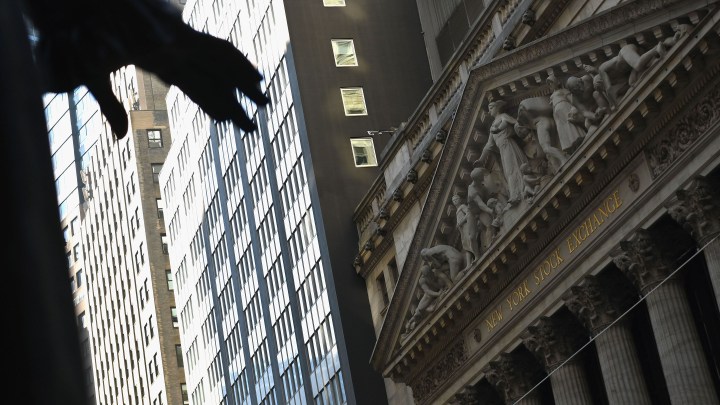
The SPAC craze, explained

Space transportation company Rocket Lab, electric carmaker Lucid Motors and flying taxi company Joby Aviation are a few of the startups to recently agree to go public by merging with a special purpose acquisition company, otherwise known as a SPAC.
These deals, sometimes called “blank-check” mergers, happen when a SPAC raises money from investors to then buy a private company, effectively taking the company public and skirting the traditional initial public offering process.
SPACs have surged in popularity lately as celebrities from Colin Kaepernick to Jay-Z have gotten involved.
Adam Lashinsky, a columnist for Business Insider, said the investment rush can be partially explained by the current climate of ultra-low interest rates.
“It’s difficult for investors to get good returns on anything other than equity investments, stock investments — which are risky by nature. But they have to take risks in order to get yield, because the money in their bank account, etc. won’t give them any yield,” Lashinsky said in an interview with “Marketplace Morning Report” host David Brancaccio.
But Lashinsky said there’s a lot of risk involved in SPACs.
“Sometimes they generate a lot of excitement and they trade for far more than the value of the cash that’s in them. And if the investments don’t work out, those investments will crater,” he said.
The following is an edited transcript of Lashinsky’s conversation with Brancaccio.
David Brancaccio: Well, aren’t you the trendy, au courant, cutting-edge doyen of culture writing about SPACs? It’s very “Q1 2021,” isn’t it?
Adam Lashinsky: The funny thing to me about that comment is that I was writing about SPACs 20 years ago when they were kind of this sordid, dirty, dark corner of the finance world. So yes, it is au courant to be writing about them again now, because they are popular now.
The appeal of the stock market with interest rates low
Brancaccio: Yeah, you’ve got celebrities and others piling into these things — in part because the stock market, fueled by low interest rates engineered by the Fed, tends to go up these days. So maybe this will make people rich quick?
Lashinsky: Well, it will make some people rich quick, as get-rich schemes often do. It’s worth pausing on what you just said for one moment: Because interest rates are so low, it’s difficult for investors to get good returns on anything other than equity investments, stock investments — which are risky by nature. But they have to take risks in order to get yield, because the money in their bank account won’t give them any yield.
How SPACs work
Brancaccio: Yeah. And just to understand what a SPAC is, it’s kind of like in the musical where they say, “Hey gang, what do you say? Let’s put on a show!” They say, “Hey, boys and girls, what do you say? Let’s buy a private company!” And then turn it into a public stock, and then hopefully that stock will go up, and that’s how we’ll get the money, right?
Lashinsky: That’s right. A normal financing situation is a company gets money from venture capitalists who are taking a big risk, it develops its product and then it goes out to the public markets for an initial public offering. This SPAC process short circuits that and says, “We are a young company that has not done anything yet, but because you, the SPAC, have raised this pool of capital already, how about buying us? And then we’ll be a public company, and then we’ll see what happens.”
Brancaccio: It’s also a shortcut on some regulation, right? So the typical initial public offering gets a measure of scrutiny from regulators. This one less so, right?
Lashinsky: That’s exactly right. A SPAC does an IPO itself, so the SPAC raises money and tells investors, “When you give us money, we’re gonna go find something to buy.” Then, when it goes and buys that company, it’s relatively simple transaction from a regulatory perspective compared to the IPO process that you described.
The SPAC landscape
Brancaccio: Now, among the risks here is that the possible targets for this are getting pretty picked over?
Lashinsky: That’s exactly right. I just looked at how much capital SPACs have raised that are looking for a company to buy, and it’s just a little bit over $100 billion. So that is a lot of capital looking for good investments. And, again, common sense and history teach us that there simply won’t be enough appropriate investments. And so these companies will either make bad investments, or they’ll give their money back to the investors, which will have been pretty much waste of time and effort.
Brancaccio: You think of big dogs putting their money into these, and they have money to burn. Will regular people suffer if this comes a cropper?
Lashinsky: Yes, quite possibly, because regular investors can invest in these SPACs because they’re publicly traded investment vehicles. And sometimes they generate a lot of excitement and they trade for far more than the value of the cash that’s in them. And if the investments don’t work out, those investments will crater. And so they’re highly speculative and open to all investors.
Brancaccio: So, an example: I had on my radar screen Lucid Motors, which is an electric vehicle startup. It wants to compete with Tesla. But you’ve written on some others.
Lashinsky: Sure. Just recently, two flying taxi manufacturers have agreed to be bought by SPACs. One is called Archer Aviation; the other is called Joby. They’ve been at it for years developing this product. They haven’t sold one yet. They have no revenue. So pretty soon you can be a public market investor in these companies, and they have no track record whatsoever. So it could prove out to be fantastic, but it could also go bust.
There’s a lot happening in the world. Through it all, Marketplace is here for you.
You rely on Marketplace to break down the world’s events and tell you how it affects you in a fact-based, approachable way. We rely on your financial support to keep making that possible.
Your donation today powers the independent journalism that you rely on. For just $5/month, you can help sustain Marketplace so we can keep reporting on the things that matter to you.

















